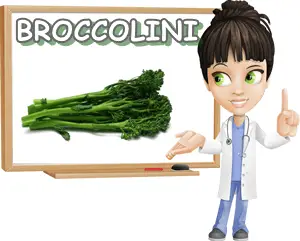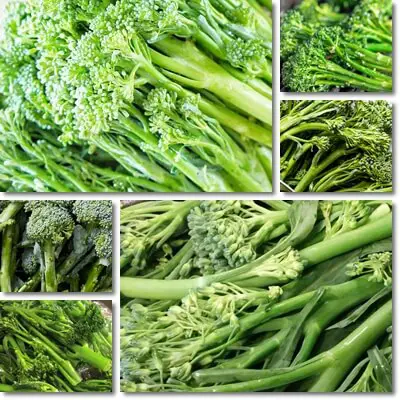Have you ever heard of broccolini? If the name sounds familiar to you, there’s a reason for that: broccolini are actually related to broccoli.
But how much different are they from broccoli? What is broccolini more exactly? Is broccolini healthy? What are the benefits of eating broccolini?
What is broccolini?
Broccolini is a broccoli-like vegetable obtained from the crossing of broccoli and Chinese broccoli, also known as gai lan or kai lan. Broccolini is better known as ‘baby broccoli’ in English, although it’s not actually baby broccoli.
The name ‘broccolini’ is a diminutive of the Italian plural form for ‘broccoli’, and references the vegetable known as broccolini as a smaller version/variety of broccoli.
Despite its name presenting it as a smaller variety of broccoli, broccolini is not, in fact, the same thing as broccoli.

What does broccolini look like?
Broccolini is a green vegetable made up of long asparagus-like stalks and looser broccoli-like florets on top.
The stalks are visibly slender and lighter green compared to the florets, with some knobs here and there, and can easily grow 30-40 centimeters long.
The florets are darker green, similar to those of broccoli, and looser set. Several florets branch out from each stalk.
Cooking broccolini for short amounts of time can brighten its color and make it a more luminous green. Roasting on the other hand can give it a yellowish tinge.
What does broccolini taste like?
The taste of broccolini is very similar to that of broccoli and asparagus, but the difference is broccolini is milder.
Broccolini indeed has bitter flavors, but they’re mild and pleasant, and complimented by faint sweet notes when cooked.
It does have the distinct taste of broccoli vegetables, that is, that somewhat sulfurous aroma, but it’s not at all excessive.
The exact taste of broccolini will depend on the age of the vegetable at harvest time.
Typically, the younger the broccolini, the milder the taste; conversely, the more mature the broccolini, the more intense the taste.
The stems themselves are more tender in younger plants and tougher in older plants, although the vegetable is largely made available young and tender.

Broccolini nutrition values
Expect broccolini to have very similar nutrition to broccoli as it’s part broccoli too.
The similar appearance, taste and flavor profile are also strong indicators of the nutritional similarity between broccolini and broccoli as certain colors and certain flavors are indicators of specific constituents.
Broccolini is naturally rich in vitamin K with even the smallest servings (e.g. 100 grams) providing several times the daily values for the vitamin for an adult person.
The green color of the stalks and florets is indicative of the high vitamin K content in broccolini.
Raw broccolini is also a great source of vitamin C providing the entire requirements for an adult person for a day. Cooking heat however cuts down on its vitamin C content.
Broccolini is also a good source of dietary potassium – a serving of 100 grams can provide 7% of all the potassium the average adult needs in a day.
Broccolini is naturally very low in sodium and cholesterol-free. It has good amounts of several B vitamins ranging from 5% to 15% of daily values, and provides around 5% of daily values for most dietary minerals including calcium, magnesium, iron and zinc.
Broccolini is low in calories with less than 40 kcal (kilocalories, calories) for every 100 grams of the vegetable. Broccolini also has a good content of dietary fiber of around 2.5 grams of fiber per 100 grams. It’s naturally very low in fat (under 0.5 grams of fat per 100 grams) and has less than 3 grams of protein per 100 grams.
The carbohydrate content of broccolini is modest: 7 grams of carbs per 100 grams, with less than 2 grams being natural sugars. But what makes broccolini healthy is its content of organic sulfur compounds called glucosinolates which are a source of anti-inflammatory and anticancer benefits.
Note:
Realistically, broccolini will not have the exact same nutritional value across all plants, although differences are, for the most part, minor.
Age of the plants at harvest time, soil quality, choice of cooking method (e.g. boiling vs steaming) and other factors will also impact the end nutritional value of broccolini.
What are the benefits of eating broccolini?
What to expect from eating broccolini in terms of benefits for health:
- Broccolini is good to eat in a weight loss diet because it’s very low in calories, low in carbs and sugar and almost fat-free.
- Broccolini has good amounts of dietary fiber to help satiate and curb hunger, and provide laxative benefits.
- Broccolini has cholesterol-lowering properties and is good to eat for high blood pressure.
- Organic sulfur compounds occurring naturally in broccolini responsible for its broccoli-like taste have anticancer benefits.
- Broccolini is one of the best anti-inflammatory foods to eat – it derives its anti-inflammatory properties from its high vitamin K content, high vitamin C content and content of organic sulfur compounds such as glucosinolates.
- Eating broccolini helps scavenge harmful free radicals and counteracts and helps repair cell damage.
- Broccolini is good for the skin – its high vitamin C content stimulates the production of collagen in the skin to help with skin elasticity and combat premature wrinkles.
- Broccolini is good for bleeding and easy bruising due to its content of vitamin K with antibleeding effects and vitamin C with wound-healing properties.
- Broccolini is a good food to eat for bone mineral density thanks to its content of vitamin K, vitamin C, calcium, phosphorus, magnesium and potassium.
- Broccolini is good to eat in pregnancy thanks to its content of vitamin B9 (folate) which helps the baby develop normally and prevents defects of the brain, spine and spinal cord.
- Broccolini has lots of B vitamins which are important for energy metabolism, muscle function and brain and nervous system activity.
Broccolini side effects & contraindications
When not to eat broccolini? There are few side effects associated with the consumption of broccolini.
Broccolini can cause bloating and gas as a result of the natural sulfur compounds it contains. It can also upset the stomach in gastritis and GERD due to its fiber content and gassy sulfur constituents.
Avoid eating broccolini too often if you have a history of blood clots and are taking anticlotting medication. Broccolini is naturally very high in vitamin K which aids in blood coagulation.
Too much vitamin K is contraindicated for anyone with a history of blood clots as it both promotes clotting and interacts with anticlotting medication. Risks include blood clots and associated cardiovascular events such as stroke.
